Good morning! It’s officially Monday evening, but good morning just the same. We’re May-ing over here, which requires hopping from one exciting moment to another so that, by the end of the day, we (okay, I) fall gratefully into bed and sleep like the dead, get up and start the next new day with just as much hopping, just as many exciting moments and exhaustion and — voila! — the week threatens to get away from me.

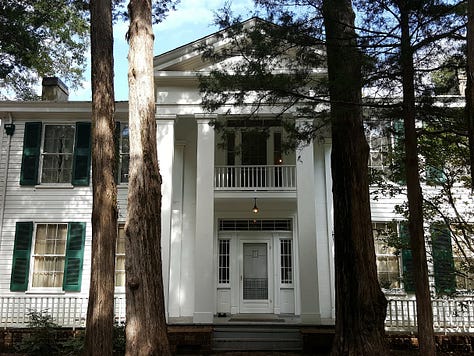
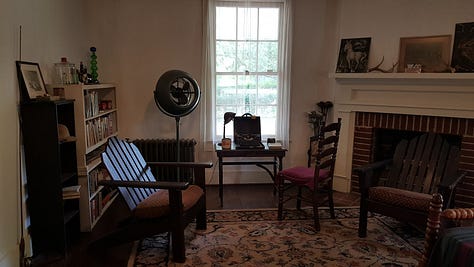
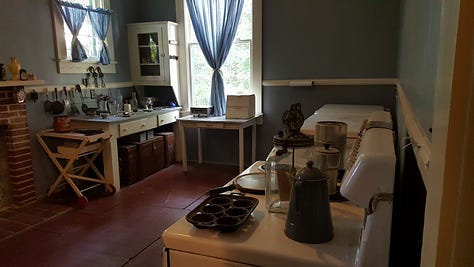
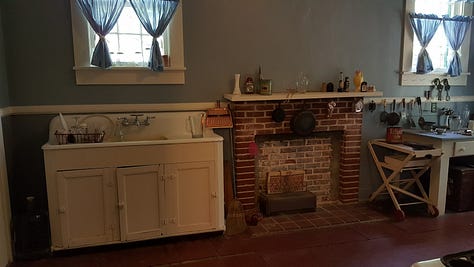
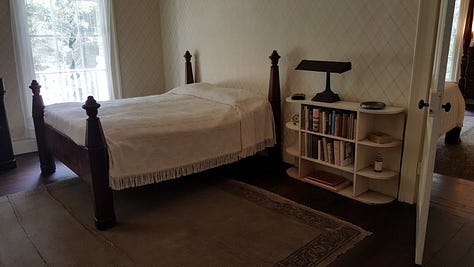
I was thinking, while I was hopping, about William Faulkner. Like you do. In the Storybelly Lab this past week, the Assignment was to read some passages I selected for study, and discuss in Chat what’s working in them — what tools is this writer using that make this piece work?
The response has been tremendous. lol. Not. :> It got me to thinking about how I learned to read like a writer, which is one of the most important tools in learning to write well — no matter what you’re writing.
I would read something that took my breath away and whisper, “How does she DO that?”
How did I learn to dissect a piece of writing, and THEN — the second part — apply what I’ve discovered to my own writing? I was thinking about a little book I received from the Book of the Month Club way long ago, when they turned 60 years old. They published a slim volume titled The Well-Stocked Bookcase, Sixty Enduring Novels by Americans Published Between 1926 -1986 and how, because I loved to read, because I wanted a well-stocked bookcase, because I wanted to be better educated, because — who knows — I made a commitment to read every one of them.
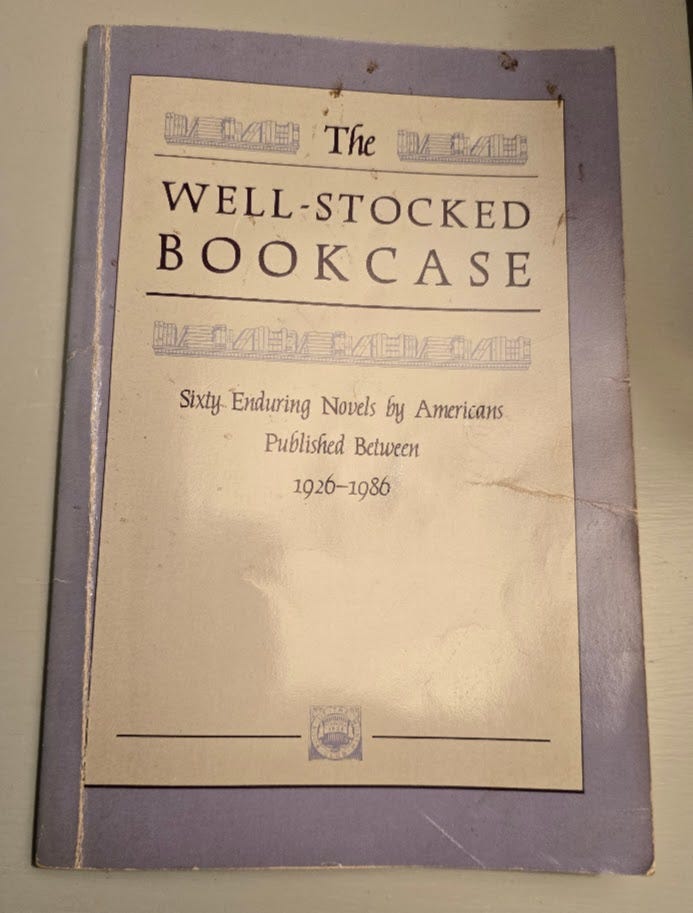
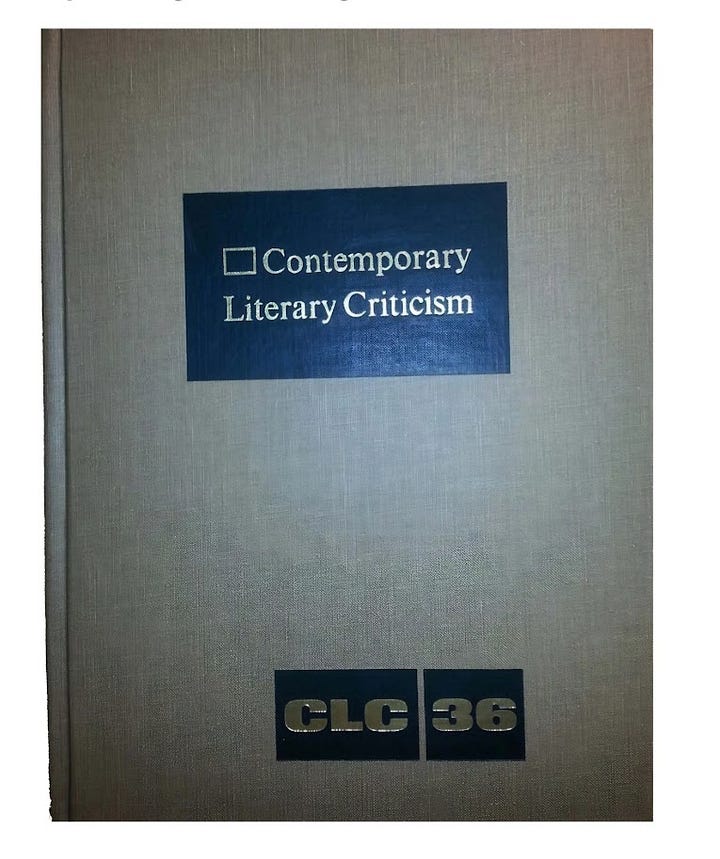
I think I read 32. But those 32 novels were my teachers. Three were by William Faulkner, and — as a Southerner going generations back and a Mississippian, too — I decided I must read Faulkner. I was young, unschooled, and I had not really learned to read yet. I could read. It wasn’t that. I didn’t understand anything about literary criticism or know how to dissect in any way what I was reading. Symbolism? What was that? Irony? What was that? On it went.
Steinbeck, Vonnegut, Updike, Capote, Hemingway, Cheever, Stegner, Mailer, Gardner, Fitzgerald, Wolfe (where were the women?); Ah, Anne Tyler and The Accidental Tourist; Toni Morrison and Song of Solomon; and Eudora Welty, who wrote what became my favorite novel of all time, Delta Wedding.
These folks were definitely not messing around. I would need help.
At the C. Burr Artz library in Frederick, Maryland, I found the set of CLC books in the reference section: Contemporary Literary Criticism. Every time I finished one of those 60 books, I would look it up in the CLC so I could understand what I had just read.
I began to realize, writers had tools. Specific tools they used to write their stories.
This study took years. It was my college education. And because I was both professor and student, I studied exactly what I wanted to know. I wanted to know how those stories worked. And I discovered something else, too: I wanted to do what those writers did.
So when I say I am a largely self-taught writer, I mean that so many of my teachers were all the books I read and studied and still read and study today. I get so much pleasure out of learning about the many, many ways that stories are told, and how my mentors did — and do — what they do.
Which brings me back to Faulkner. I read The Sound and the Fury — it was on the list of 60 American novels. I had no idea what was going on in that book. I thought Faulkner was just “not for me.” The CLC explained a lot of it to me, but it was slow going, as many of the concepts were new to me. There was another Faulkner on the list that I skipped. Then I picked up The Reivers.
Oh, The Reivers! That book has taught me so many things… one of which is I have family stories to tell. Every Aurora County book owes part of its existence to The Reivers. I have read more Faulkner since I first read The Reivers, but this one remains his most accessible book — for me. It is straight-ahead storytelling with a compelling plot and an oh-so-satisfying conclusion.
The movie that was made from the book in 1969 stars Steve McQueen and is narrated by Burgess Meredith. My dad loved it so much he piled us all in the car one summer when we came to visit them in Jackson, Mississippi and drove us to the town where the movie was filmed — it was a long way away and the kids were cranky and we all got ice cream when we got there and then turned around and went home because there was nothing to do in this rural town in the middle of nowhere — I digress. But here is some good news: You can watch the full movie at YouTube here. It is wonderful. [Edit: the sound appears to be a bit out of sync… hmmm. I notice that the movie is also at Prime Video.]
The Reivers changed the way I thought about storytelling. It changed my inner landscape of storytelling. It showed me that there were ways to structure a story that had never occurred to me. Ways to talk about race and generations and small towns and tender moments and the affection of growing up in Mississippi — or anywhere, really. Ways of telling. Ways of writing.
It would be 15 more years of study — study that included 10 years of sending off stories that were rejected by editors in New York City — before I found an editor who said, I really like it; are you willing to work on it? and then five years more of learning how to craft and revise a novel before it was finally published. I had so much to learn, and no tool was more foundational for me than learning how to read like a writer.
I didn’t use any excerpts from The Reivers for last week’s Writers Lab assignment, but I’m going to put an excerpt here, in the Digest. And I’m going to assign everyone a writing exercise to do, see below.
In the Lab this week we’ll continue to explore reading like a writer — look for my posts in Chat for each of the excerpts I offered for study in the Lab on Friday. Join me there, Lab Coats! What tools are these writers using to help them tell their stories?
And if you’d like to hang out with us in the Writers Lab and learn more about reading like a writer and applying what you’re learning to whatever you are writing, you can join us here.
If you’re on Spotify (or even if you’re not), you can hear John Williams and the Boston Pops playing a Suite from The Reivers (that beautiful music you hear in the first minutes of the movie, too), with Burgess Meredith’s voice-over — so nice… the part I most want you to listen to is at the end. Start at either 16:40 or (to follow the excerpt exactly) 17:20.
Here’s the Spotify link:
And here is the excerpt — from the script, similar to the book, but not exactly (or literarily) the same, as it’s meant for another medium:
As we turned up the street toward home, I thought, there’s something funny here; it hasn’t even changed. If all the things I had seen and done and heard and learned had changed nothing, if nothing was smaller or larger or older or wiser, then the last four days had been wasted. I could not understand why everything was the same when I was not the same anymore. For I had had my moment of glory, that brief, fleeting glory, which of itself cannot last, but while it does is the best game of all.
I’ll append Faulkner’s original text below, and we could go into the differences between one version and the other, but what I want y’all to do, really, is this:
Write about your moment of glory. That brief fleeting glory, which of itself cannot last, but while it does, is the best game of all.
Post your moment in comments below. Don’t think too hard about it — just do it — I can’t wait to see what you come up with.
And here is Faulkner’s original:
We crossed the street toward home. And do you know what I thought? I thought _It hasn't even changed._ Because it should have. It should have been altered, even if only a little. I don’t mean it should have changed of itself, but that I, bringing back to it what the last four days must have changed in me, should have altered it. I mean, if those four days--the lying and deceiving and tricking and decisions and undecisions, and the things I had done and seen and heard and learned that Mother and Father wouldn't have let me do and see and hear and learn--the things I had had to learn that I wasn't even ready for yet, had nowhere to store them nor even anywhere to lay them down; if all that had changed nothing, was the same as if it had never been--nothing smaller or larger or older or wiser or more pitying--then something had been wasted, thrown away, spent for nothing; either it was wrong and false to begin with and should never have existed, or I was wrong or false or weak or anyway not worthy of it.
Whoa. :> It goes on from here, whereas the Pops version ends the Suite. The “moment of glory” is in there, it’s just in another scene, when Lucius is riding on the back of the race horse Lightning. There are good reasons why each version is effective, eh?
You can read the entire novel online here, or get it at your local library or indie or used bookstore, of course… I bought my copy (as you can see on the book’s sticker upthread) at Wonder Book and Video in Frederick, Maryland, in the 1980s, when Wonder Book was a brand-new brick and mortar store. I see several copies available there, online, right now, including the DVD of the movie.
The Aurora County books — Ruby, Little Bird, All-Stars, and Cakes, are influenced by The Reivers, and take inspiration and courage from that book.
As I say every week, I hope you connect to your own home and place in history — and tenderness — when you read and share these books. You can find out more about them at my website, here.
And that’s a wrap for Digest #13. Thank you for every comment, every share, every restack, and every good wish — I feel them, and you all inspire me!
xoxoxo Debbie








In Chat, I'm taking each excerpt in Exercise #10 "The Tendrils of Tenderness," and responding to the tools I see each writer using in these excerpts -- reading like a writer. Come along with me and tell me what you notice, and see how you can use these tools in your own writing, all in the Storybelly Writers Lab. There's a new Chat thread for each excerpt. We've got work from Harper Lee, Anne Moody, Sue Hubbell, and Katherine Paterson represented. Start here: https://open.substack.com/chat/posts/b4419247-6fcd-4f39-a7e5-09965f0e9e73
Oh, you wanna hear something REALLY crazy? I dreamed about Faulkner last night. He was alive and well and hosting an event. I was in attendance and he was very gracious towards me and everyone else there. When I woke up this morning, I thought, Well, that was odd. Why did I dream about William Faulkner?
Perhaps it is because I need to pay careful attention to this post and read some Faulkner! Thanks for this educational post! I’m looking forward to watching that movie for sure. 😊